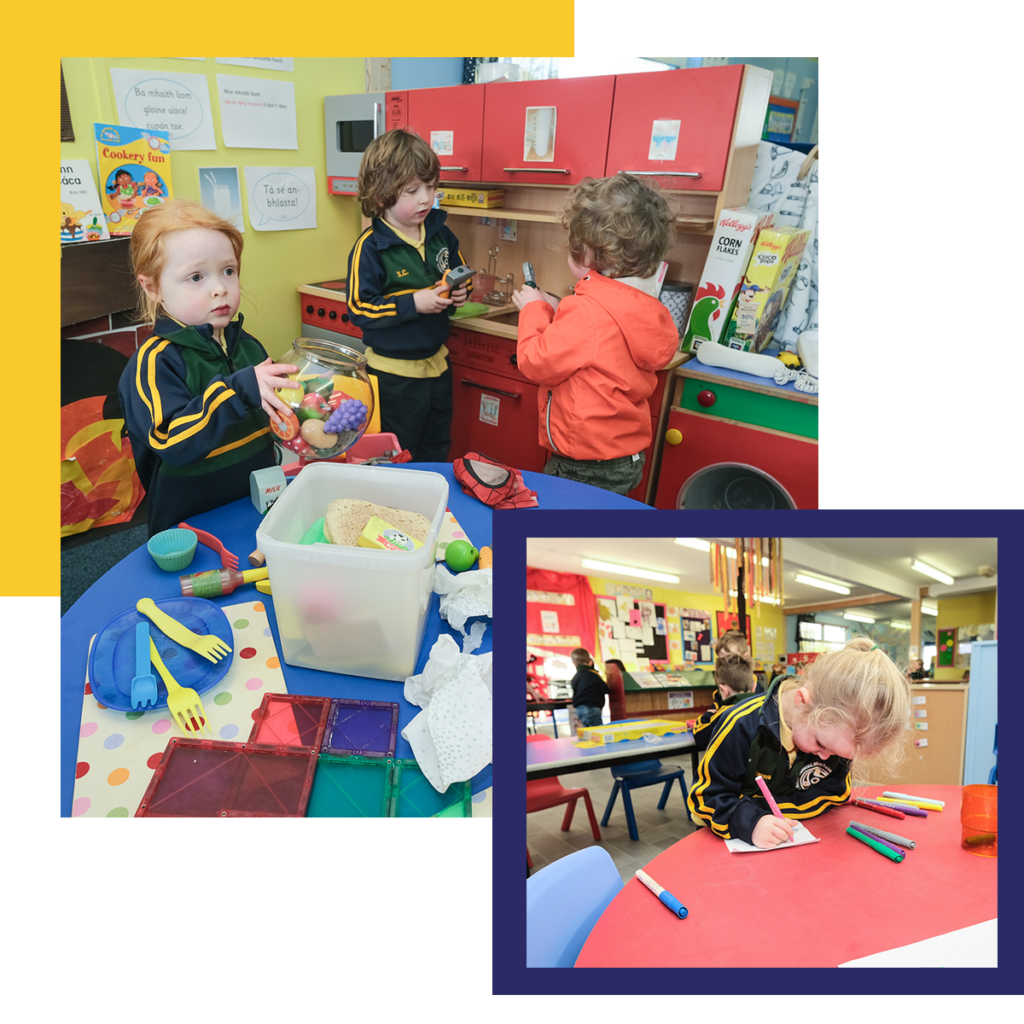Are looking for a Pre-School Place for Sept 2026?
We hope this short pamphlet will assist you as you decide, but if you still have questions and would like more information, please contact us or your local naíscoil or gaelscoil directly. They'll be only too happy to help!

What is a Naíscoil?
The naíscoil provides an excellent opportunity to parents to try Irish Medium Education – even if you opt to send your child to an English speaking primary school your child will have benefitted from an enriching experience that opens their mind to other languages and other cultures in their future life.
Enrollment for funded Pre-School Places is now open on the EA Website. Find out more here.
Extended Services

Naíscoil Bheag/Pre-Pre Sessions
Naíscoil Mhachaire Rátha & Naíscoil Charn Tóchair are delighted to launch their new Naíscoil Bheag sessions specifically designed for pre pre sessions and younger children.
Offered in an entirely separate room from the main pre-school setting, Naíscoil Bheag offers your child the chance to explore a play led programme, with additional sensory play experiences, specifically targeted at their developmental needs.
Available up to four mornings per week up until 12.15 each day (with the option of a lunch club until 2pm).
Find out more now by emailing eolas@naiscoil.org or call us on 07512 691973.
Why Choose Irish Medium Education?
Children Become Fluent Bilinguals
This occurs naturally without the children having to ‘learn’ the language in the traditional sense. Immersion education is regarded by many as the most effective means of learning a second language.
Easier to Learn a Foreign Language
Bilingual children are much more likely to learn foreign languages to a higher level of fluency than their monolingual counterparts.
Employment Benefits
Irish is the best modern language to have in seeking employment in Ireland in the 21st Century. Opportunities are to be found in the rapidly growing education sector, the media, publishing, translation, the civil service as well as youth and community work.
Improved Performance in English and Maths
Research has shown that children who received their primary education in the Irish-medium sector, on average, demonstrate higher levels of attainment in English and Maths than their monolingual counterparts. “Irish language primary schools are outperforming English language schools not only in Maths but in English, figures have revealed”.
Improved Problem Solving Abilities
Research has shown that bilingual children, on average, demonstrate higher problem solving abilities, better attention and task switching capacities than their monolingual counterparts. Bilingual children outperform children who speak only one language in problem-solving skills and creative thinking, according to a study conducted by Strathclyde University with colleagues from the University of Cagliari in Sardinia (Aug 2012).
Better Memory
Learning a second language is beneficial for overall cognitive development, including memory. Since bilinguals have to store two sets of vocabulary in their mind and are used to accessing the correct one, they get great practice at storing and using information. Plus, good memory helps with studying, another reason bilingual students do better in school than monolinguals.
Improved Life Chances
In later life, bilingual children have been shown on average to have higher educational attainment, improved employment prospects and higher earnings than their monolingual counterparts. A research briefing published by the Department of Education indicated that former pupils of Irish-medium schools attained a higher academic standard than might be expected amongst the general population of the same age group (Gallagher and Hanna 2002).
Community and Social Benefits
Children become part of a young, vibrant Irish-speaking community and develop a strong sense of belonging, with a broader cultural experience and increased understanding and acceptance of other languages and cultures. Research commissioned by the Department of Education indicated that pupils of Irish-medium education in the north had a very positive attitude to the educational and cultural experience they received, and that, due to the cultural enrichment these children experienced, on the whole they were more open to cultural diversity. (Gallagher & Hanna 2002).
The ability to converse in a second language appears to protect the brain against devastating damage to mental functions. The University of Edinburgh found that 40 per cent of bilingual patients regained normal function following a stroke, compared with just 20 per cent of those who spoke only one language. (The Telegraph, Science Editor, Nov 2015) Researchers from the University of Ghent in Belgium provided more evidence to the claim that people who speak more than one language may delay the onset of Alzheimer’s disease and dementia.

Frequently Asked Questions
No. You don’t need to be fluent in Irish, or even to speak Irish at all, for your child/ren to attend a naíscoil. In fact over 95% of parents with children in Irish-medium education have very little or no Irish. For parents who are interested in learning Irish, having a child at the naíscoil is a good way to learn a little bit of the language yourself. But whatever your own experience of Irish, we will provide resources to help you support your child’s language journey.
A bilingual education gives your child the gift of two languages. Research has shown that having two languages from an early age helps cognitive and academic development, improves problem solving abilities, and makes it easier for them to learn additional languages. Bilingual education also has community and social benefits as children become oart of a young vibrant Irish-speaking community.
No. The Naíscoil provides an excellent opportunity for parents to try Irish-medium education. Even if you opt to send your child to an English-speaking primary school your child will have benefited from an enriching experience.
No. The research show that children who are bilingual actually perform better at both English and Maths by the end of their primary education.
Grúpa Tuistí & Tachrán
Parent & Toddler Group
Every Wednesday at An Carn starting 25th Sept 2024 10am - 11:30am
Every Friday at Naíscoil Mhachaire Rátha 9:30am - 11am. Starting Friday 28th Sept



